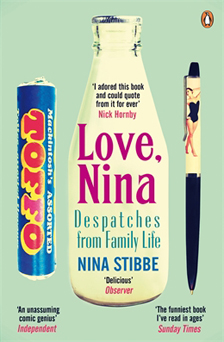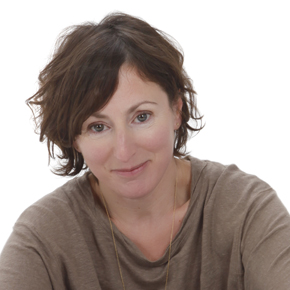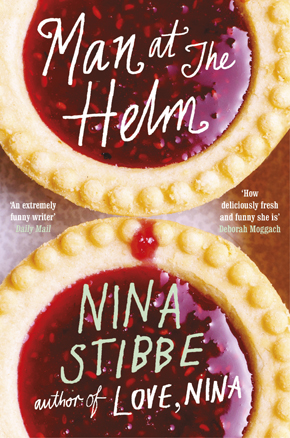Nina Stibbe: Out of the box
by Alex Peake-TomkinsonNina Stibbe’s first book Love, Nina, a collection of letters written when she was a nanny in the 198os, was the surprise publishing hit of 2013. Andrew O’Hagan called her “The funniest new writer to arrive in years.” In Love, Nina she mentions writing a (semi-autobiographical) novel as part of her polytechnic course. After the success of her first book, her publishers were naturally keen to take a look at that novel which is now published as Man at the Helm. Over breakfast, she explains how she felt about unearthing it.
“I love stationery, do you?” she begins. “I’ve got this really lovely flappy box, bright red from Ryman’s – is Ryman’s still around? I put all my essays and anything connected in that box and it was really lovely to read it. The most interesting thing for me, and I’ve said this a couple of times at events, is that I spent time trying to do more worthy things. You know how you do? You have a go at a historical novel, you do lots of research about what happened to the Dutch Jews during the war. I went through lots of much more important and interesting subjects and so I’d forgotten all about it.”
I ask if she thinks it helped leaving such a personal book to sit for a while, or was that a coincidence?
“It was a coincidence but yes you’re right, that story would have been… well, I just wouldn’t have been able to be publish it because my mum is so identifiable. It’s not a faithful portrait of her but it clearly is her and it would have been unfair. Before I sent it to anybody, I had to have her read and say it was okay. She was fine, she was more than fine about it. She’s a cultural person, she loves books and poetry and plays and she’s very booky. She believes in art and she believes in literature, and that on its own always meant she was going to say it was okay because she’s read enough stories like that and loved them and they’ve meant a lot to her so I didn’t really think she would ever say no. Bits worried her a lot but she’s an incredibly brave woman and she’s quite rebellious in a way, and that’s partly what got her into trouble because she wouldn’t do things everybody else’s way – and that’s linked to the central motivation of me writing the book, right at the beginning. If she’d been a man, she would be everybody’s hero, if she’d done things her way, bringing up four kids, she would be a hero. But she wasn’t.”
Is that to do with the era, do you think?
“Definitely to do with the era. Did you see my piece in the Guardian about the divorce thing? [Man at the Helm is partly a fictionalised account of her parents’ divorce.] You know they say when you write for the Guardian, never read the comments? And I have written for the Guardian and had grotty comments. For instance I wrote a piece about something or other and in it I mentioned that I’d weed in a basin – which wasn’t a huge revelation because it was in Love, Nina and it was in my partner’s university halls of residence. Anyway, one of the mean comments was that I was really posh for calling it a basin not a sink and I thought ‘Fuck off, I weed in it! I’m not posh!’ Anyway, for the divorce piece, the comments are lovely, saying, on the whole, ‘Thank you for writing this, this is what it was like and we had a tough time.’ It was so moving. There were 50 or 60 comments saying ‘You’ve described my childhood.’
Everybody’s been so thrilled with it! Lots of people saying to me ‘I recognise that.’ I had a slight worry that people might find it a misery memoir and not find it a nice, funny story as well.”
“I think it was the era and it was nobody trusting a woman without the guiding hand of a man. I mean, we were quite nice… my siblings and I were chatting about it the other day and one of them said he used to wonder what we had done wrong, because we honestly didn’t know…”
Doesn’t this reaction make her feel that, actually, the story in Man at the Helm is just as worthwhile as stories about Dutch Jews, etc.?
“Yes, and everybody’s been so thrilled with it! Lots of people saying to me ‘I recognise that’ and other people just saying it’s a lovely story. I was very nervous about it. I had a slight worry that people might find it a misery memoir and not find it a nice, funny story as well.
“I saw Chocolat, the film, recently – do you know it? She’s a single mum and she turns up and everyone’s a bit cross with her and of course it’s very romantic because it’s chocolate and it’s lovely and she woos them with the sexy chocolate. And I thought, I recognise that, that mistrust… if only my mum had opened a chocolate shop! But it’s a happy ending, Alex!” And then she shows me a picture on her phone of her stepfather.
“Something that hasn’t come up and I wish it had in reviews, is the wonderfulness of a good step-parent. I realised that in writing this book, it’s a thank you to my stepfather. It’s dedicated to him. He was hard on us but… it had to be.”
 I ask if she’s innately rebellious
I ask if she’s innately rebellious
“In some things, but I think I’m a bit of an attention-seeker. I love funny things. That’s an important thing to say, that we were always having a laugh.”
We talk about divorce and she says, “I took my dog to the groomer the other day and I met this woman who was really excited because her dog had just been accepted as a therapy dog, which means you take your dog to nursing homes or hospitals, places where people love dogs but can’t have a dog and you take your dog to play with them. It made me nearly cry with joy to hear of such a thing! And I said ‘What a lovely thing to do, why did you think of it?’ and this woman said ‘I’m on a high because my husband and I split up! I’ve had the best six months of my life.’ I said ‘What about him?’ And she said, ‘He’s the same! We meet up once a fortnight in a pub and tell each other what we’ve been doing and it’s fantastic!’ Don’t get me wrong,” Stibbe adds, “I’m very happy with Nunney [her partner] and I won’t be consciously uncoupling but I think we all need to think of our older lives as being as full of possibilities, in fact more full than our younger lives.”
Lastly, we talk about the family she was a nanny for. They were not any old family, of course. Mary Kay Wilmers was co-founder of the London Review of Books and lived with her two sons Sam (who suffers from the rare genetic condition Riley-Day syndrome) and Will, by the film director Stephen Frears. Their neighbours included the writers Claire Tomalin and Michael Frayn, the director Jonathan Miller, and Alan Bennett came round most evenings for dinner. I ask her why she thinks she fitted in so well.
“Mary Kay Wilmers was not so dissimilar to my mum. She was very booky, a single mum, divorced, the house was chaotic with people coming and going. She wasn’t your normal, boring 35-year-old that she might have been. She loved everything, no, she was interested in everything. If the sewer burst at Camden Lock she wouldn’t go ‘Oh no!’ she would say ‘Wow, I wonder how it happened?’ That’s what I love about her, and my mum’s like that too.” And with that she pays for our breakfasts, hugs me and heads back to Nunney and her two kids in Cornwall.
 Nina Stibbe left Leicestershire for London as a teenager and after two years as a nanny studied Humanities at Thames Polytechnic. After graduating in 1987, she worked for a while in a Camden frock shop, and in 1990 began a career in book publishing, working in various departments before becoming a commissioning editor at Routledge. In 2002 she moved to Cornwall with her partner and children where she writes, swims and makes bread. Man at the Helm is published in hardback by Viking. Read more.
Nina Stibbe left Leicestershire for London as a teenager and after two years as a nanny studied Humanities at Thames Polytechnic. After graduating in 1987, she worked for a while in a Camden frock shop, and in 1990 began a career in book publishing, working in various departments before becoming a commissioning editor at Routledge. In 2002 she moved to Cornwall with her partner and children where she writes, swims and makes bread. Man at the Helm is published in hardback by Viking. Read more.
ninastibbe.com
Author portrait © Rebecca Dawe
Alex Peake-Tomkinson is a contributing editor at Bookanista and writes book reviews and features for the Mail on Sunday, the TLS and the Daily Telegraph.
@AlexPeakeTom


